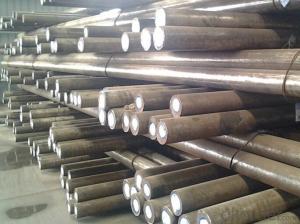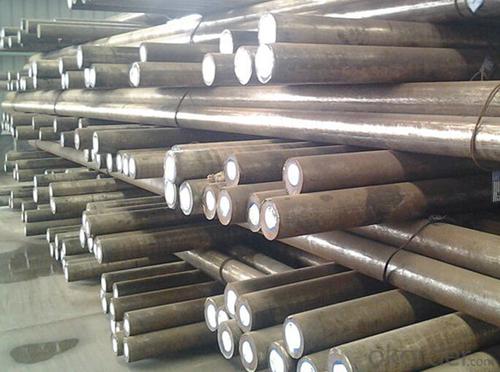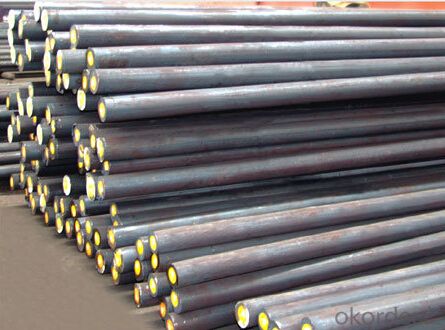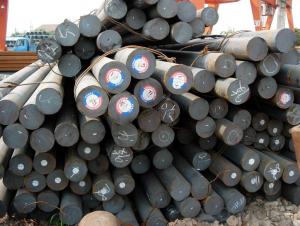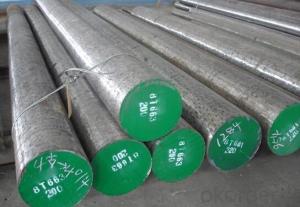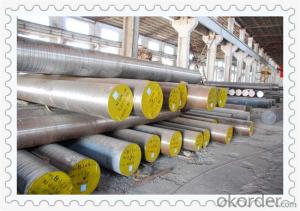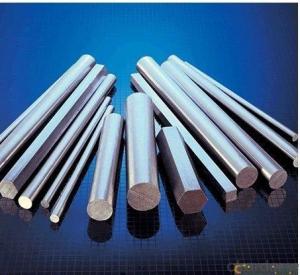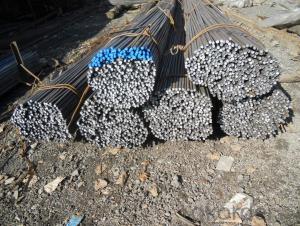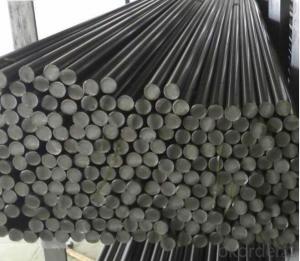Grade DIN41C4 alloy steel round bars Hot Rolled
- Loading Port:
- Tianjin
- Payment Terms:
- TT OR LC
- Min Order Qty:
- 3 m.t.
- Supply Capability:
- 10000 m.t./month
OKorder Service Pledge
OKorder Financial Service
You Might Also Like
Specification
Product Description:
1. Commodity: Round steel bar
2. Technical: Hot rolling
3. Length: Min. 5.8meter, according to requirement.
4.Diameter: 16mm-250mm
OKorder is offering Grade 41Cr4 alloy steel round bar at great prices with worldwide shipping. Our supplier is a quality manufacturer of steel, with our products utilized the world over. OKorder annually supplies products to European, North American,African and Asian markets..etd. We will quote you our most competitive prices within 24 hours after received the inquiry and guarantee the quality.
Product Applications:
Grade DIN41Cr4 Alloy steel round bar are ideal for structural applications and are widely used in the
Gear, Sleevesspool,Shaft, Crankshaft, Pin,Gear, Sleevesspool,Shaft, Crankshaft, Pin
Product Advantages:
OKorder's Grade DIN41Cr4 alloy steel are durable, strong, and resist corrosion.
Chemical Composition
Grade | C | Si | Mn | Cr | Ni | Cu | P | S |
40Cr | 0.37-0.44 | 0.17-0.37 | 0.50-0.80 | 0.80-1.10 | ≤0.30 | ≤0030 | ≤0.035 | ≤0.035 |
41Cr4 | 0.38-0.45 | ≤0.40 | 0.60-0.90 | 0.90-1.20 | ≤0.030 | ≤0.030 | ≤0.035 | ≤0.035 |
5140 | 0.38-0.43 | 0.17-0.37 | 0.70-0.90 | 0.70-0.90 | ≤0.030 | ≤0.030 | ≤0.040 | ≤0.035 |
Mechanical Properties
Grade | Tensile Strengthσb (MPa) | Yield Strength | Elongation | Reduction of Area ψ (%) | Impact Akv(J) | Hardness |
|
| |||||
σs (MPa) | δ5 (%) | |||||
41Cr4 | ≥980(100) | ≥785(80) | ≥9 | ≥45 | ≥47 | ≤207HB |
Packaging & Delivery
Standard seaworthy packing or as customer required
Leadtime
Delivery time: Within 30 days after order is confirmed.
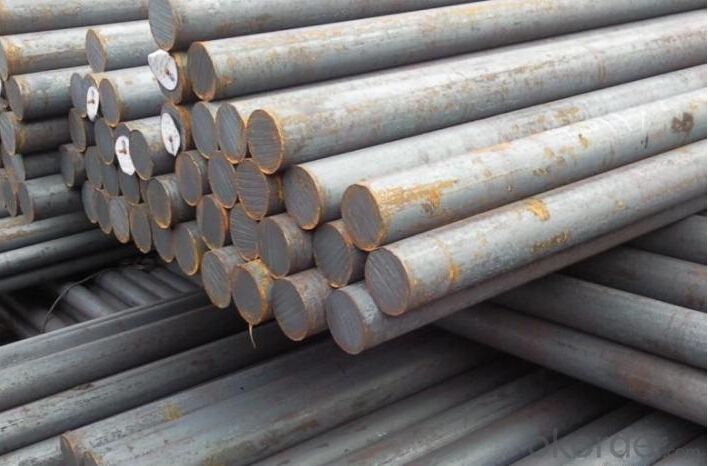
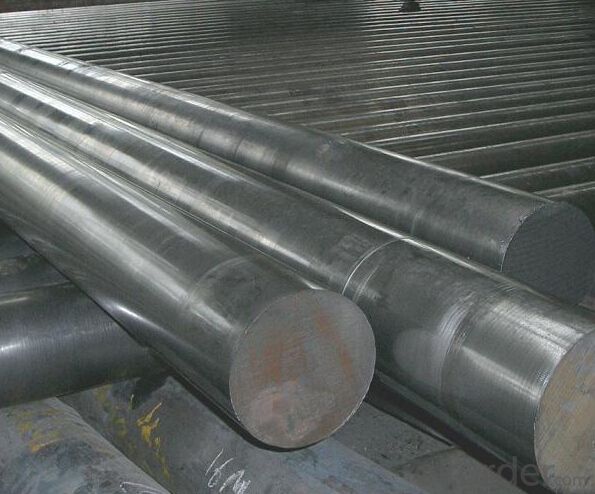
- Q: What are the different quality control measures for special steel production?
- There are several quality control measures for special steel production, including thorough material inspections, precise chemical composition analysis, stringent dimensional and shape control, non-destructive testing methods such as ultrasonic and magnetic particle inspections, and rigorous mechanical property evaluations. Additionally, heat treatment processes and surface treatments are closely monitored to ensure the desired properties and surface finish of the special steel. Continuous monitoring and quality checks are essential throughout the production process to maintain the highest standards and meet customer requirements.
- Q: How does special steel perform in high-pressure applications?
- Special steel performs exceptionally well in high-pressure applications. This type of steel is specifically designed to withstand extreme pressure conditions, making it an ideal choice for industries that require reliable and durable materials for their operations. One of the key characteristics of special steel is its high tensile strength, which allows it to handle immense pressure without deformation or failure. This strength is achieved through alloying elements and heat treatment processes that enhance the steel's structural integrity. As a result, special steel can withstand the intense forces exerted on it in high-pressure environments, ensuring the safety and efficiency of the equipment or structures it is used in. Furthermore, special steel exhibits excellent resistance to corrosion and oxidation, further enhancing its suitability for high-pressure applications. This resistance helps maintain the structural integrity of the steel, preventing any weakening or degradation that could compromise its performance under pressure. Additionally, special steel's resistance to corrosion ensures that it can withstand harsh environments, such as those found in oil and gas extraction, chemical processing, or power generation industries. Another advantage of special steel in high-pressure applications is its ability to retain its mechanical properties even at elevated temperatures. This property is crucial in industries where high temperatures are involved, such as aerospace, nuclear power, or steam generation. The steel's high-temperature strength and stability enable it to withstand the combination of high pressure and elevated temperatures, ensuring reliable performance and long-term durability. In summary, special steel is an excellent choice for high-pressure applications due to its high tensile strength, resistance to corrosion and oxidation, as well as its ability to maintain its mechanical properties at elevated temperatures. Its exceptional performance in these demanding conditions makes it a reliable and durable material for industries that operate under high-pressure environments.
- Q: What are the different methods for improving the magnetic properties of special steel?
- Improving the magnetic properties of special steel can be achieved through various methods. One effective approach is heat treatment, which involves subjecting the steel to specific heating and cooling processes. This alters the atomic structure of the steel, enhancing its magnetic properties. For example, annealing the steel at high temperatures and slowly cooling it can create a fine-grained microstructure, resulting in improved magnetic performance. Another method is alloying, where certain elements like nickel, cobalt, or aluminum are added to the steel. Even small amounts of these alloying elements can significantly enhance the steel's magnetic characteristics, increasing its saturation magnetization and improving coercivity. Cold working, also known as cold deformation, is another technique that can improve the steel's magnetic properties. By subjecting the steel to mechanical stress at low temperatures, dislocations and defects are formed within its crystal structure, leading to improved magnetization, permeability, and reduced hysteresis losses. Grain orientation is yet another method to improve the magnetic properties of special steel. This involves aligning the grains of the steel in a specific direction through processes like hot rolling or magnetic annealing. This alignment results in anisotropic magnetic properties, meaning the steel will exhibit different magnetic characteristics depending on the direction of the applied magnetic field. Surface treatments can also be utilized to enhance the magnetic properties of special steel. Coatings such as electroplating, electroless plating, or chemical vapor deposition can modify the steel's surface, improving its magnetic performance. These treatments reduce eddy current losses, enhance corrosion resistance, and increase magnetic permeability. It is important to consider specific requirements and desired characteristics when choosing a method to improve the magnetic properties of special steel. Each method has its own advantages and limitations, and factors like cost, feasibility, and desired magnetic performance should be taken into account.
- Q: What are the different forging techniques for special steel parts?
- There are several forging techniques that can be used for special steel parts, including open die forging, closed die forging, and ring rolling. Open die forging involves shaping the steel by repeated hammering or pressing between flat dies, allowing for a range of shapes and sizes. Closed die forging, on the other hand, utilizes specially designed dies to shape the steel into a specific form, resulting in higher precision. Ring rolling involves shaping a circular piece of steel into a seamless ring by applying pressure from radial rolls. These techniques offer varying advantages depending on the desired shape, size, and properties of the special steel part being forged.
- Q: What are the different methods for improving the corrosion resistance of stainless special steel?
- There are several methods for improving the corrosion resistance of stainless special steel. Some of the common methods include alloying the steel with elements such as chromium, nickel, and molybdenum, which enhance its resistance to corrosion. Another method is passivation, which involves treating the steel with an acid solution to remove any surface contaminants and create a protective oxide layer. Coating the steel with materials like paint, powder coating, or electroplating can also improve its corrosion resistance. Additionally, proper cleaning and maintenance practices, such as regular removal of dirt and debris, can help prevent corrosion and maintain the steel's resistance over time.
- Q: What are the different methods of surface polishing for special steel?
- There are several methods of surface polishing for special steel, each with its own advantages and applications. Some of the commonly used methods include mechanical polishing, electrochemical polishing, and chemical polishing. 1. Mechanical Polishing: This method involves the use of abrasive materials to remove surface imperfections and create a smooth and reflective surface. It can be done manually or using automated polishing machines. Mechanical polishing is effective for removing scratches, dents, and other surface defects. It is commonly used in industries such as automotive, aerospace, and precision engineering. 2. Electrochemical Polishing: Also known as electrolytic polishing, this method uses an electrolyte solution and an electric current to dissolve and remove surface material. Electrochemical polishing can provide a high level of surface smoothness and can be particularly useful for complex shapes and hard-to-reach areas. It is commonly used in industries such as medical devices, semiconductors, and jewelry manufacturing. 3. Chemical Polishing: This method involves the use of chemical solutions to selectively remove surface material and create a smooth finish. Chemical polishing is effective for removing oxide layers, stains, and contaminants. It is often used for stainless steel and other corrosion-resistant alloys. The process involves immersing the steel in a chemical bath and controlling factors such as temperature, concentration, and time to achieve the desired surface finish. 4. Electropolishing: Electropolishing is an electrochemical process that combines the benefits of electrochemical and chemical polishing. It involves the application of an electric current to remove surface material while simultaneously dissolving it in an electrolyte solution. Electropolishing can provide a highly smooth, clean, and corrosion-resistant surface finish. It is commonly used for stainless steel and other alloys in industries such as pharmaceutical, food processing, and semiconductor manufacturing. 5. Vibratory Polishing: This method utilizes vibrating media, such as ceramic chips or abrasive pellets, along with a polishing compound to remove surface imperfections. The steel parts are placed in a vibratory tumbler or bowl where the continuous movement causes the media to rub against the parts, resulting in a polished surface. Vibratory polishing is commonly used for small or delicate parts and can be an efficient and cost-effective method. Overall, the choice of surface polishing method for special steel depends on factors such as the desired surface finish, part geometry, material properties, and industry requirements. It is important to consider these factors and consult with experts or specialists to determine the most suitable method for a specific application.
- Q: How is nitriding steel used in surface hardening processes?
- Nitriding steel is used in surface hardening processes by introducing nitrogen into the surface layer of the steel through a controlled heat treatment. This process enhances the hardness, wear resistance, and fatigue strength of the steel, making it more durable and suitable for applications that require high surface hardness and improved performance.
- Q: What are the different surface treatments for special steel?
- There are several different surface treatments available for special steel, each serving a specific purpose and offering unique advantages. Some of the most common surface treatments for special steel include: 1. Galvanizing: This process involves coating the steel with a layer of zinc, which provides excellent corrosion resistance. Galvanizing is a popular choice for outdoor applications where the steel is exposed to moisture and harsh environmental conditions. 2. Powder coating: Powder coating involves applying a dry powder to the steel surface, which is then heated and cured to form a durable and protective coating. This treatment offers excellent resistance against corrosion, chemicals, and UV rays, making it ideal for various applications, including automotive parts, appliances, and outdoor furniture. 3. Nitriding: Nitriding is a surface hardening treatment that involves diffusing nitrogen into the steel surface. This process significantly increases the surface hardness, wear resistance, and fatigue strength of the steel. Nitriding is commonly used for high-performance components, such as gears, crankshafts, and injection molding screws. 4. Electroplating: Electroplating involves depositing a layer of metal, such as chromium, nickel, or gold, onto the steel surface through an electrochemical process. This treatment enhances the steel's appearance, provides corrosion resistance, and improves wear resistance. Electroplating is often used for decorative purposes or to enhance the performance of components in various industries. 5. Passivation: Passivation is a chemical treatment that removes iron contaminants from the steel surface, creating a passive oxide layer. This layer acts as a barrier against corrosion, improving the steel's resistance to rust and other forms of degradation. Passivation is commonly used for stainless steel components in industries such as food processing, pharmaceuticals, and medical devices. 6. Carbonitriding: Carbonitriding is a surface treatment that involves introducing carbon and nitrogen into the steel surface at high temperatures. This process forms a hardened case, improving wear resistance and fatigue strength. Carbonitriding is often used for high-stress components, such as gears, crankshafts, and camshafts. These are just a few examples of the different surface treatments available for special steel. The choice of treatment depends on various factors, including the desired properties, application requirements, and budget constraints. It is essential to consult with experts or manufacturers to determine the most suitable surface treatment for specific steel applications.
- Q: How does special steel perform in cryogenic toughness?
- Special steel performs well in cryogenic toughness due to its unique composition and manufacturing processes. It is specifically designed to maintain its strength, hardness, and toughness even at extremely low temperatures. This makes it highly resistant to brittle fracture and ensures reliable performance in cryogenic applications, such as liquefied natural gas (LNG) storage tanks, aerospace components, and superconducting magnets.
- Q: Are there any disadvantages of using special steel?
- There are several disadvantages associated with the use of special steel. To begin with, special steel tends to be more expensive compared to regular steel. This is primarily due to the additional alloying elements and heat treatments involved in its production, which contribute to the higher cost. As a result, it may not be the most cost-effective option for applications where cost is a major factor. Furthermore, special steel may have limited availability in comparison to regular steel. It is often produced in smaller quantities and may only be obtainable from specific suppliers. This can lead to longer lead times and difficulties in sourcing the required amount of special steel, particularly for large-scale projects. Additionally, the increased complexity of working with special steel can pose challenges. It may require specialized knowledge, skills, and equipment for handling and processing. If the necessary expertise or resources are not readily available, this can result in higher manufacturing costs and potential delays in production. Moreover, some special steel grades with high strength and hardness can be more prone to brittleness. This means they may be susceptible to cracking or breaking under certain conditions, especially when exposed to extreme temperatures or sudden impact loads. This limitation can be a disadvantage in applications that require high toughness or resistance to fracture. Lastly, special steel may have limited applications due to its specific properties. While it offers advantages such as corrosion resistance, high temperature resistance, or improved mechanical properties, these benefits may not be relevant or necessary for every application. Consequently, using special steel in such cases may incur unnecessary expenses without any tangible benefits. In conclusion, special steel has its drawbacks, including higher costs, limited availability, increased complexity, potential brittleness, and limited applicability. Therefore, it is crucial to carefully consider the specific requirements of a project before opting for special steel.
Send your message to us
Grade DIN41C4 alloy steel round bars Hot Rolled
- Loading Port:
- Tianjin
- Payment Terms:
- TT OR LC
- Min Order Qty:
- 3 m.t.
- Supply Capability:
- 10000 m.t./month
OKorder Service Pledge
OKorder Financial Service
Similar products
Hot products
Hot Searches
Related keywords
